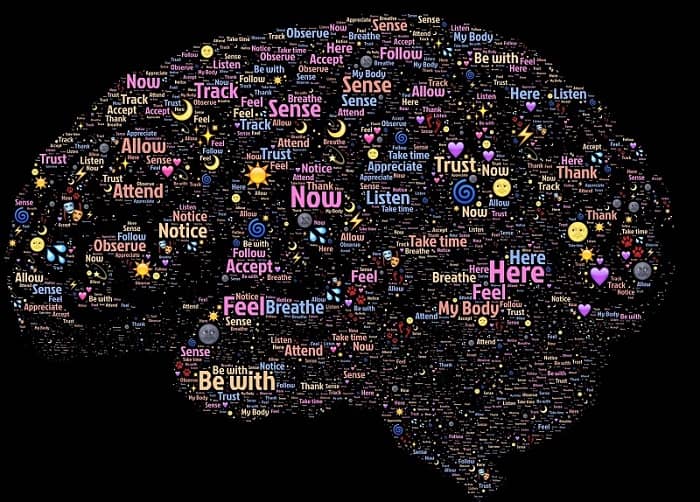


31 Dec Benefits/Effects of Meditation: Here’s How It Works Scientifically
The brain acts as the central operating system of our body. It is not only responsible for sending signals to other parts of the body but also acts as a receptor of senses through which we feel the outside world.
What you might not know is that meditation positively affects an individual’s psychological and physiological senses. It also impacts the conscious and subconscious mind in a positive healing manner.
Many studies conducted so far to study the effects of meditation on our brain offered astonishing results.
Let us first understand how meditation impacts the human brain.
What Does Meditation Do to the Brain?


Here are some of the effects meditation has on your brain:
#1. It is amazingly wonderful to know what meditation can do to the brain.
There is enough scientific evidence to show that with the help of meditation the prefrontal cortex of the brain gradually thickens with the passage of time.
#2. The prefrontal cortex is the central part of the brain that responds to manage high order brain functions, such as concentration, awareness, and decision making.
Meditation helps the higher-order function of the brain to increase and decrease the lower-order brain activities. In short, meditation empowers one to train and control their brain.
#3. Meditation also reduces the impact of aging on the brain. Scientific studies have proved that the brain begins to deteriorate after the age of twenty.
However, people in their 40s-50s can be able to maintain their brain quality like someone in their 20s or 30s with the help of meditation.
#4. The density of grey matter present in the brain is responsible for muscle control and sensory perception, such as seeing and hearing, memory, emotions, speech, decision making, and self-control.
The density of grey matter present in the brain gradually shrinks with age. But meditation seems to have delayed this process. Meditation is really effective in controlling neurotransmission in the brain.
Thus, we can safely conclude that we have enough evidence to prove that meditation does work scientifically.
Meditation, in fact, has all the features of logical, systematic, variable cause and effect just like any scientific theory has.
And guess what, meditation is not only good for the brain but also leaves a positive effect on your body.
Now, when we are aware of what meditation can do to the brain, let’s analyze some of the scientific benefits of meditation.
Scientific Benefits of Meditation for the Brain



Purely on scientific grounds, meditation can alter your sense of well-being and cognitive functions. Here are some points to take note of.
#1. Meditation Contributes to a Greater Sense of Well-Being
Like exercise for your body, meditation helps to condition your mind.
People who meditate consistently often are better able to control their emotions and have fewer mood swings. As a result, meditation proves to be an effective strategy for stress management.
#2. Meditation Helps to Maintain Brain Health as Your Age Progresses
Generally, a brain begins to deteriorate as age progresses. However, this deterioration can slow down with the help of meditation.
Adults can make it a habit to meditate on a regular basis. And even a few minutes can induce a sense of peace and calmness as an added benefit.
#3. Meditation Relieves Mental Stress
One of the most common reasons people try meditation is to reduce their stress levels. Mental and physical stress increases the levels of the stress hormone called cortisol.
This cortisol in the elevated stage releases chemical cytokines, which are responsible for disrupted sleep, depression, and anxiety.
Cortisol also increases blood pressure and causes fatigue and clouded thinking.
Meditation helps relieve stress and, as a result, also controls cortisol secretion in the body.
#4. Meditation Improves Concentration
The straying of the mind from one thought to another in the scientific world is termed the ‘monkey mind’.
Meditation helps a lot in improving concentration and keeps you more focused on the work.
#5. Helps to Overcome Addiction
Overcoming an addiction requires a lot of self-confidence, control, and discipline.
Research has proven that the withdrawal symptoms or the craving is way lower in an addict who meditates.Related: Effects of Addiction on Brain
#6. Meditation Helps in Reducing Depression
Studies have proven that meditation helps in keeping away negative thoughts, loneliness, and depression.
A study conducted by Filip Raes on 400 adult students in Belgium who participated in mindful meditation programs showed a considerable reduction in negative thoughts, stress, and depression that lasted up to six months after the training. (Ramel, Goldin, Carmona, & McQuaid, 2004).
#7. Meditation Helps in Dealing with ADHD Syndrome
A brain examination conducted by Professor Eileen Lugers at UCLA laboratory of Neurology testified that those practicing meditation had more gyrification (folds in the cerebral cortex).
More gyrification meant better focus, improved selective attention, and faster information processing by the brain.
Further digging up the topic allows us to know that our central processing unit, i.e., our brain, is full of neurons.
These neurons are information and command receptors. So, let us further investigate the neuroscience of meditation.
The Neurological Benefits of Meditation
Meditation has been around for several thousand years. Scientists today suggest meditation as an all-around solution to lifestyle malfunctions.
They have put forth some stunning evidence on how meditation rewires the neural channels to strengthen our inner peace and equilibrium.
Based on such shreds of evidence, it’s almost certain that meditation does work scientifically and affects neurological functions.
1. Meditation promotes mental balance by controlling the “monkey mind”.
Monkey Mind is a term for the brain activity known as the “Default Mode Network” (DMN).
The DMN causes the mind to wander and engage in non-targeted pieces of information. It distracts us because it is responsible for what we think when we are at leisure.
Reduced DMN activity in the brain can be a possible answer to why people practicing meditation can remain more focused all the time.
2. Neuropsychological studies suggest that with the help of regular meditation we can feel in ‘control’ of our thoughts in every situation.
The lateral prefrontal cortex is the center of the brain that enables us to think logically and rationally. And meditation influences it positively.
3. Meditation impacts the medial prefrontal cortex, commonly known as the “Me Center”.
‘Me center’ is responsible for our perceptions, understanding, and knowledge.
All of these are responsible for regulating our emotions, reactions to anxiety, fear, and bodily sensations, such as pain, hunger, and thirst.
Clearly, meditation helps in improving your brain.
But do not be mistaken! Its effect is not only limited to the brain, but it has an overall positive effect on the entire body.
Effects of Meditation on the Body



Some of the positive effects of meditation on our body are as follows:
#1. Adds More to Fitness
We cannot achieve ideal fitness only by workout or physical exercise.
A sound peaceful mind is equally important to achieve ideal fitness. With a clouded mind that’s full of negativities, any physical exercise will unlikely yield positive results.
Scientific studies have suggested that meditation boosts the lymphocyte count in the body.
Thus, developing a natural shield to stop toxic cells to create fatal diseases, such as cancer.
#2. Meditation Helps to Build Resiliency Against Pain
A study conducted by the University of Montreal involved two groups who were exposed to extreme heat for a short duration.
One group was of Zen Buddhists Masters who practiced meditation for a long time and the other group involved thirteen people who never in their life had practiced meditation.
Researchers found that Zen masters who practiced meditation for a long time felt less pain than the other group.
So, by now we are aware of what meditation can do to our mind and our body.
Now, you might be all geared up to start a meditation routine.
However, before that, you ought to know more about one of the most popular meditation forms called mindfulness meditation.
Like these impacts of meditation, mindfulness works scientifically too.
Let’s analyze what we mean by mindfulness.
What is Mindfulness?



Mindfulness is a type of meditation in which you are made to focus on being intensely aware of what you sense or feel without the fear of any judgment or interpretation.
It involves practicing different breathing methods, the use of many guided imagery, and other practices to relax the body and mind and help reduce stress.
Now since we are aware of what mindfulness means, let’s answer the whys and hows of does mindfulness meditation works scientifically!
How Does Mindfulness Work Scientifically?
According to neuroscience research, steady mindfulness practices improve the relationship between the amygdala and prefrontal cortex.
Both of these parts of the brain help us to be less reactive to the situation which causes stress and to recover better from stress when we experience it.
A study conducted over eight weeks suggests that a type of meditation known as ‘mindfulness meditation’ successfully reduced the inflammation in the brain caused by stress, and all symptoms reduced significantly.
The Bottom Line
After reading the entire blog, the scientific advantages of meditation are determined without an iota of doubt.
The best thing about meditation is that everyone can do it to improve their mental and emotional health. And it doesn’t require any special equipment like other forms of physical exercise.
As a result, it is highly accessible for everyone and can be done anywhere.
Apart from this, it is extremely easy to enroll yourself in meditation courses or find a support group that generally is widely available.
So, what are you waiting for?
Stop wondering why and how meditation works scientifically because it does work, and science supports it.
Start meditating to lead a more emotionally satisfying and less stressful life from today itself.
Do you meditate and have experienced the effects yourself? Share your experience with us down in the comments section.



No Comments